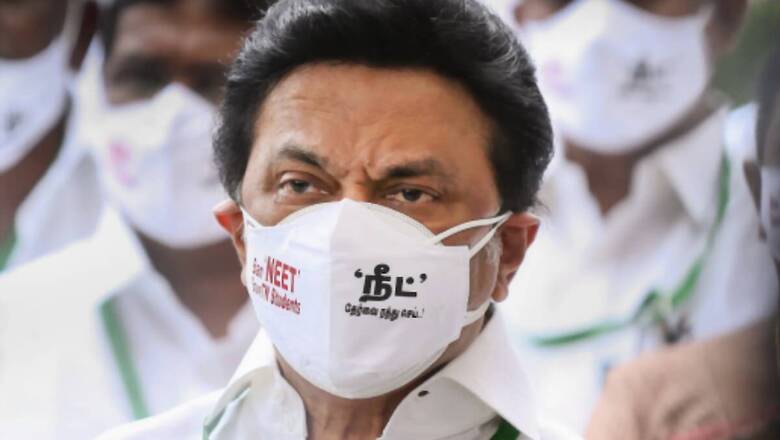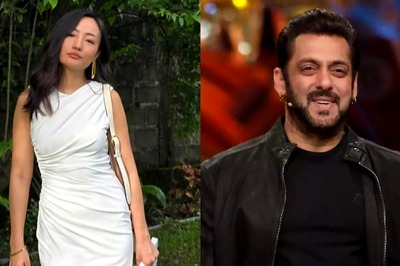
views
Chennai: DMK President M K Stalin, who on Monday turned up at monsoon session of the Tamil Nadu Assembly wearing a ‘Ban NEET, Save TN Students’ face mask, appears to have unleashed a diatribe against medical entrance test and wants it scrapped.
In an exclusive e-mail interview to CNN News18, Stalin reasons why his party stands, and will continue to stand, in the way of the BJP Government on many issues such the National Education Policy, the NEET exam, and continue to condemn other actions such as the demonetisation and GST. In a scathing remark about the issue that has kept Tamil Nadu on the boil, Stalin terms NEET as the guillotine that has taken many lives.
He also weighs in on the Sushant Singh Rajput case, commenting that the Narcotics Control Bureau joins the long list of “autonomous” institutions such as the CBI and ED hammered out of shape to sway to the tunes of the ruling establishment in Delhi. Edited excerpts:
Won’t the DMK’s opposition to the National Education Policy — revised to reflect the changed education scenario — affect its interests?
The DMK will never stand in the way of a reform to reflect the changes brought over time. In fact, it was in the rule of Thalaivar Kalaignar that the Samacheer education system was introduced, which led to a reduction in burden and knowledge enhancement among students. Because of that, more students have been able to pass exams, equip themselves with the skills required for higher education, and employment. The Narendra Modi government’s education policy is exactly the opposite of it.
The efficient and truly improvement-focused method would be each state framing their own policies, basing them on their students’ mother tongues, their ability to grasp concepts, pass percentage, dropout ratio, and so on. But in the new education policy state rights have been totally denied. There is a tendency to forcibly impose other languages. In the name of industrial training, the policy destroys infrastructural facilities and opportunities necessary for students to go for higher education. The exam structures are built in a way that they act as stumbling blocks in the path of students willing to continue their education. As far as the DMK is concerned, we are firm in our resolve to bring education back to the State List. It should not remain in the Concurrent List. In Tamil Nadu, where the two-language policy has been in practice for over half a century, there should not be any imposition of Hindi or Sanskrit. Tamil Nadu has an infrastructure that has managed a higher pass percentage, in comparison to other states, in terms of school education and other higher levels. We will not allow its destruction.
You are opposing the National Eligibility Cum Entrance Test, too. Why?
Until twelfth grade, the education system is such that students can choose their subjects for higher secondary education depending on their areas of interest. In 2007, during the rule of Thalaivar Kalaignar, the Public Entrance Test was abolished and students were able to participate in the counseling sessions of engineering and medical universities based on their class 12 marks in a transparent, single window system. Many became engineers and doctors during the next 10 years because of that. Particularly, the education dreams of children of suburban and rural neighbourhoods, and those from oppressed communities became real. In every family, that progress was visible. NEET, an unnecessary eligibility test, has turned out to be a destroyer of such dreams, and has dismantled the social justice supporting the entry of students into government-run colleges in Tamil Nadu.
From Ariyalur Anitha (who took her own life in August 2017) to Jothi Sridurga (who died on September 12, 2020), NEET has become a guillotine that has taken away so many lives.
The BJP maintains that DMK and other parties oppose NEET because it stands in the way of several politicians and businessmen who live on the high fees charged by private medical colleges. What do you have to say to that?
This is a diversionary tactic to take attention away from the crux of the issue. In the name of NEET, there has been proliferation of coaching centres that charge exorbitant fees running into lakhs, and the BJP government has paved the way for a scenario where it is commonly understood that such training is necessary to enter medical studies. In this, there are several connected with the BJP. Occurrence of malpractices in exam procedures and other irregularities, facilitated through these NEET coaching centres, have also been exposed. On top of that, the proportion of rural students gaining entry into government-run medical colleges has also been declining. NEET is a fundamentally bad ‘kill-loot’ scheme. That is why the DMK stands firmly against it.
Does it bode well for our national interests if the DMK, the third largest party in the Lok Sabha, staunchly opposes every effort of the Centre?
A majority of the schemes/plans advanced by the BJP government turn out to be partisan, alienating towards some sections of the people, and non-inclusive, and that is why the DMK often opposes it, as a responsible opposition party should do.
Take the case of demonetisation. Prime Minister Modi had hailed it as a move targeted against terrorism and black money. To the question as to how much black money has been recovered, there has been no answer. Terrorism does not seem to have been completely eliminated either. It was the poor and middle-classes that bore the brunt of demonetisation. Besides all that, the Modi government’s action (demonetisation) brought the people of the country to the streets in the middle of the night!
In a similar action, introduction of the GST turned out to be deeply impactful move across industries — from small and medium-scale enterprises to large enterprises. In fact, in one of the mentions of the AIADMK government in the Assembly, it was brought out that many industries had to shut shop after the introduction of the GST system. Across the country, the situation is the same. In a severe implementation, higher taxes were imposed but the Centre did not distribute the collected taxes properly in the states. Because of this, several states, including Tamil Nadu, have been facing a financial crisis. Drawing higher taxes from developed states, not devolving a commensurate amount, and letting flow a higher amount to states that collect lesser taxes is a partial, unequal, and unfair approach. That is why the DMK has been opposing it from the beginning. We are not in power. But, for the sake of state rights, regardless of who is in power now, the DMK is finding itself raising its voice for all, including those in power. The DMK’s voice remains as one reflecting the sentiments of all states.
That is why I’d written letters to several state chief ministers regarding the allocation mechanisms in the Fifteenth Finance Commission. By aligning with them, we will strengthen efforts towards more fund devolution to states.
By virtue of the majority enjoyed in Parliament, the BJP government has obtained the people’s mandate to bring these schemes, say BJP leaders. What is your reaction to that?
As per the current Indian electoral system, a majority of seats cannot be construed as the unified support of all people. In the absence of unification of opposite votes, or when votes are split, it should be easily possible to obtain a majority. It is because of this nature that the DMK has been demanding elections based on proportional representation since the times of Arignar Anna (CN Annadurai).
In the name of a majority government, to refuse to constructively utilise that strength, to deny welfare to states, to crush democratic values, and to use the majority to one’s own preferences is absolutely unconstitutional.
What is happening in Jammu & Kashmir? Is it democratic to hold representatives of the duly elected government under house-arrest, scrap special privileges extended to the state, and curtail free movement of people? It is democratic that a Union Minister professes ignorance about a resolution passed to “Ban NEET” unanimously by the ruling government and the opposition parties?
To turn autonomous institutions such as the CBI and Enforcement Directorate in the hands of the Centre, and to push the Election Commission of India to such a state is democracy?
Through the NIA, to brand democratic forces as “traitors,” “urban Naxals” and “anti-nationals” — is democracy? And now, to use the Narcotics Control Bureau in the same vein, for political score-settling, is a kind of democracy?
Majority should not be used as a tool to muzzle democratic dissent. Democracy is about protecting the voice of fairness and justice, as enshrined in the Indian constitution.


















Comments
0 comment